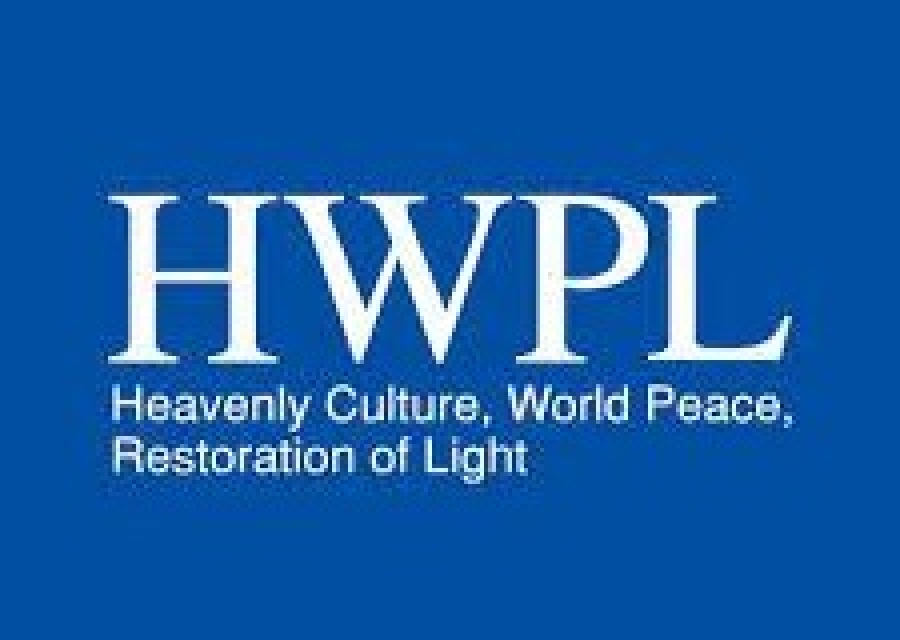The organization is actively engaged in peace initiatives in conflict-ridden nations, with notable success in resolving the Mindanao conflict in the Philippines.
In this interview, the chief manager of Global branch 04 of HWPL discusses the importance of a culture of peace and the transformative "Peace City, Dili Project" in Timor-Leste. HWPL's vision extends beyond ending wars, emphasizing the establishment of sustainable peace through collaborative efforts.
When and how was HWPL established? Please describe the formal process of its founding and the peace activities it has done, going from South Korea to many countries?
“Established for the cessation of global wars and the promotion of world peace ”
The Heavenly Culture World Peace and Restoration of Light (HWPL) is an international peace organization established on May 25, 2013. Rooted in the 'Declaration of World Peace,' HWPL actively promotes peace beyond borders, cultures, and ideologies. HWPL advocates for the 'Establishment of Peace International Law' as practical steps towards ending war and realizing lasting peace. In pursuit of this objective, HWPL has conducted 32 global peace missions, engaging with current and former presidents, religious leaders, legal professionals, civic organization leaders, journalists, and individuals from diverse fields. As a result, 189 peace advisors and 634 peace ambassadors were appointed, and agreements such as MOAs and MOUs were signed with 451 organizations globally, achieving significant milestones. Utilizing this peace network, HWPL collaborated with international law experts from 15 countries to draft Article 10, Section 38 of the 'Declaration of Peace and Cessation of War (DPCW).' This document, recognized as the institutional foundation for world peace, has garnered support from civil societies in 176 countries.
Who is the chairman of HWPL?
"A Peace Pioneer Transforming the Era"
From the era of war to the era of peace!"
Chairman Lee Man-hee, the representative of HWPL, is a war veteran who served as a frontline combatant during the Korean War (625 War). Having experienced the sacrifices of comrades, he dedicated his life to the pursuit of peace. Chairman Lee, at the age of 93, continues to lead global peace initiatives with unparalleled planning and execution capabilities. Through 32 peace tours to over 70 countries, he engaged with leaders, including presidents, chief justices, religious figures, and media representatives, urging collaborative efforts for peace. Renowned for pioneering initiatives such as Peace International Law, religious harmony, and peace education, Chairman Lee is a prominent figure in the global peace movement.
Emil Constantinescu, former President of Romania, presented the "25th Anniversary Commemorative Medal for the Collapse of Eastern European Communism" to Chairman Lee. This medal has been awarded to the president who contributed to the democratization of Eastern Europe, making it significant for Chairman Lee as a civilian organization representative to receive it. In Mindanao, Philippines, Chairman Lee was awarded a plaque of appreciation expressing gratitude for the Mindanao Peace Accord and the success of the International Peace Conference. The Kingdom of Bapuocang in the Republic of South Africa declared 'HWPL Day,' erected a peace monument, and awarded Chairman Lee with a medal of merit.
Among the various conflict-ridden nations worldwide, which countries does HWPL engage in peace activities with, and what specific initiatives are being pursued?
"Spreading Peace Solutions to Over 100 Countries"
HWPL implements three groundbreaking projects to address conflict root causes and establish sustainable peace:
- Establishment of international laws prohibiting war
Declaration of Peace and Cessation of War (DPCW), comprised of 10 articles and 38 clauses, aims to restore the spirit that served as the basis for the establishment of the United Nations and to achieve sustainable peace by promoting the universal values of the global community.
- Resolution of religious conflicts through religious alliances
Recognizing the crucial role of religious harmony in achieving global peace, HWPL operates religious alliance offices, religious peace camps, and dialogue forums worldwide. Since many religious scriptures commonly address values such as peace, justice, human dignity, respect, and reconciliation, religious leaders and followers can foster interfaith harmony by concentrating on these shared values and understanding each other's scriptures.
- Promotion of peace education to nurture peace ambassadors
Currently, 379 schools worldwide have been designated as HWPL Peace Schools. In addition, agreements have been made with the education ministries of 12 countries and MOAs (Memorandum of Agreement) to prepare for government-level peace education. Furthermore, MOUs (Memorandum of Understanding) have been signed with UNESCO National Commissions of various countries to promote peace education at an international level.
Many officials from countries currently in conflict are meeting with Chairman Man Hee Lee of HWPL to explore ways to achieve peace. This is because Chairman Man Hee Lee successfully mediated and resolved the conflict in Mindanao, Philippines, which neither the UN, governments, nor any other peace organization could resolve. Mindanao Island is one of the world's most notorious areas for a bloody conflict, with over 120,000 casualties during a 40-year civil war. Chairman Man Hee Lee identified the root cause of the Mindanao conflict as a Catholic-Muslim religious dispute and brought together leaders from both sides to lead a civil peace agreement. As a result, the conflict that had persisted since 1970 was practically brought to an end.
Even in the recent Israel-Hamas conflict, HWPL issued a statement urging the cessation of all wars and violent acts, expressing the commitment to peacebuilding. Looking ahead, we hope that through the ongoing peace efforts of HWPL, more conflict-ridden areas will be able to restore the peace they have long yearned for.
Does HWPL believe that engaging in peace activities, especially in conflict-ridden countries globally, is important? If so, why?
"Transcending war through a culture of peace to achieve sustainable peace"
While HWPL is actively working to stop wars and spread a culture of peace globally, the organization believes that more is needed than simply ending wars. HWPL emphasizes the importance of awakening a love for peace in people's hearts and instilling a culture of peace. Just as one cannot say, 'I don't have cancer because I took painkillers and don't feel pain,' one cannot claim it's peaceful just because there is no immediate war. HWPL goes beyond resolving conflicts and advocates for peace culture through international law, peace education, and religious unity. Chairman Lee emphasized that collaborative efforts under the name of peace are crucial for achieving sustainable peace.
What is the main goal of HWPL's peace activities, particularly in Timor-Leste on a global scale?
"The international hub of peace, Timor-Leste"
Timor-Leste's success in overcoming past conflicts peacefully is globally notable case. If Timor-Leste continues to pursue and sustain peace, it can serve as a model for the world and a compass for other conflict-ridden nations.
HWPL is working on the "Peace City, Dili Project" to achieve sustainable peace in Timor-Leste. This project consists of three components: Public Art, Peace Journalism, and Peace Education. If the Timorese government and citizens actively participate in the "Peace City, Dili" project, Timor-Leste can become a symbol of peace globally, attracting attention and recognition. It is anticipated that in the future, Timor-Leste, as a peaceful nation, could host international conferences on East Asian peace, not only leading to the development of local communities and tourism, but also strengthening the unity of the East Timorese people. We kindly request strong support from the government and the people for this project, which holds significant potential.
What peace initiatives has HWPL undertaken in Timor-Leste, especially in the capital, Dili? How were peace activities conducted in Dili, Timor-Leste? (Past and future activities)
"Transforming Dili into the Cilty of Peace Peace through Art, Education, and Journalism"
HWPL actively promotes three key projects in Dili: Public Peace Art, Peace Journalism Education, and Peace Higher Education.
(1) Public Peace Art
HWPL initiated the Public Peace Art project in collaboration with enthusiastic youth volunteers- university students, and local artists. With the aim of beautifying Dili, promoting local businesses, and strenghtening community bonds, HWPL launched its inaugural Public Peace Art project on August 1, at the heart of Dili—the Xanana Sports Center. Over 30 university students from six different universities, alongside artists from six art groups, volunteered their time and creativity to beautify their community. HWPL will continue its Public Peace Art project in Dili to spread the culture of peace.
(2) Peace Journalist
HWPL collaborates with the Timor-Leste Press Council to conduct 'Peace Journalism and Media Literacy Education' for journalists in 2024. The purpose of this education is to strengthen the capacity of journalists and achieve sustainable peace and development in Timor-Leste through professional peace journalism.
HWPL invited Timor-Leste Press Council to World Peace Summit held in Korea and engaged in profound discussions. To facilitate the implementation of the education, HWPL and TLPC signed an MOU agreement on 24 November.
(3) Peace Education
On December 15, 2023, HWPL initiated its 'Peace Educator Training' at the Ministry of Higher Education, Science, and Culture conference hall. A total of 28 professors/lecturers from 12 out of 19 higher institutions in Timor-Leste actively participated. Notably, UNDIL and UNPAZ formalized an MOU with HWPL to implement Peace Education in 2024. Currently, HWPL is teaching Korean and English classes for free at UNDIL. Additionally, the 'Peace Children's Choir Launching Ceremony' took place at Lighthouse International School on November 27.
These activities are actively unfolding thanks to the support of the peace-loving citizens of Timor-Leste, the efforts of the Timor-Leste government, and the leadership of Chairman Lee Man-hee and HWPL.
Based on HWPL's mission, what is the view of the chief mananger of Global branch 04 of HWPL on global peace, especially regarding Timor-Leste's role in building world peace?
HWPL is working towards achieving global peace based on its mission, and expecting that "Timor-Leste" could become a catalyst for global promotion. Timor-Leste, having achieved independence through the people's vote, is now encouraged to demonstrate that eternal peace is possible.
HWPL aims to establish true international peace laws to achieve sustainable peace and leave a legacy of peace for future generations. The Declaration of World Peace in 2013 proclaimed the need for international laws to end global wars, and an agreement was made at the 2014 World Peace Summit to create peace international laws. In 2016, the 'Declaration of Peace and Cessation of War' (DPCW) was announced, and efforts are ongoing to turn this declaration into a legally binding peace international law.
As a 'Peace Nation,' Timor-Leste is hoped to support and lead in endorsing this international law. If Timor-Leste supports this law, the message will be even more powerful. President Gusmao advocated for reconciliation rather than revenge for the people who suffered during the colonial period, actively practicing peace. His statement in the January 5, 2022 interview, "The past is the past. Now we have to work for the future," is truly moving. We, as ambassadors of peace, born in the same era, have a mission to achieve peace in this age and leave a beautiful legacy for future generations. Let us all unite and leap for peace. We are one!







